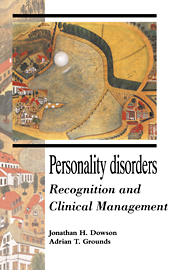Book contents
- Frontmatter
- Contents
- Acknowledgement
- Part One Recognition
- 1 Personality disorders: basic concepts and clinical overview
- 2 Specified personality disorders: clinical features
- 3 Personality disorders: less specific clinical presentations and epidemiology
- 4 Longitudinal aspects of personality disorders
- 5 Assessment of personality disorders
- Part two Clinical management
- References
- Index
1 - Personality disorders: basic concepts and clinical overview
from Part One - Recognition
Published online by Cambridge University Press: 19 October 2009
- Frontmatter
- Contents
- Acknowledgement
- Part One Recognition
- 1 Personality disorders: basic concepts and clinical overview
- 2 Specified personality disorders: clinical features
- 3 Personality disorders: less specific clinical presentations and epidemiology
- 4 Longitudinal aspects of personality disorders
- 5 Assessment of personality disorders
- Part two Clinical management
- References
- Index
Summary
Psychiatric disorders
‘Personality disorders’ consist of maladaptive patterns of motivated behaviour that are usually evident for at least several years. They form one of the main categories of psychiatric disorders.
Psychiatric disorders are usually defined in terms of signs and symptoms. ‘Signs’ are phenomena related to biological functioning and, in this context, consist of behaviour, while psychiatric ‘symptoms’ refer to the patient's complaints of adverse experiences. These include ‘mental’ phenomena, involving what has been called conscious awareness. The term ‘patient’ usually refers to someone who is being seen by a medical practitioner (or other health-care worker) in a professional context.
Behaviour can be defined as what an individual says or does, but only if it is associated with conscious awareness, so that an involuntary movement such as a tremor would not qualify. Also, behaviour includes what is not said or done; for example, patients with phobias may avoid a range of situations. The various mental phenomena which underlie motivated behaviour can be described by such terms as thoughts, ideas, memories, moods, attitudes and feelings, while the concept of conscious awareness can be extended to include the ‘unconscious’ or ‘subconscious’; this involves higher mental activity that can influence conscious mental phenomena, although the person is not aware (or not fully aware) of these processes. For instance, a person may ‘unconsciously’ avoid keeping a series of appointments with his/her doctor because of a fear of having a serious illness diagnosed, even though the individual does not seem aware of the reason.
- Type
- Chapter
- Information
- Personality DisordersRecognition and Clinical Management, pp. 3 - 42Publisher: Cambridge University PressPrint publication year: 1995
- 1
- Cited by



